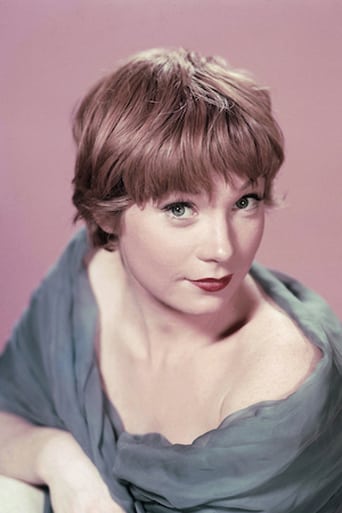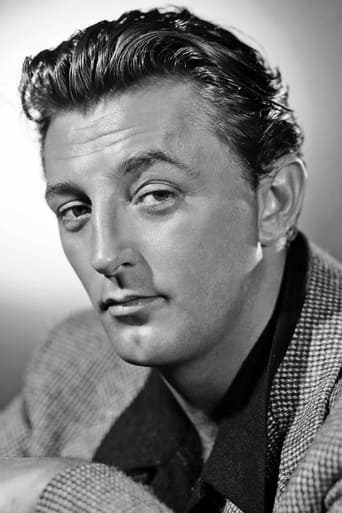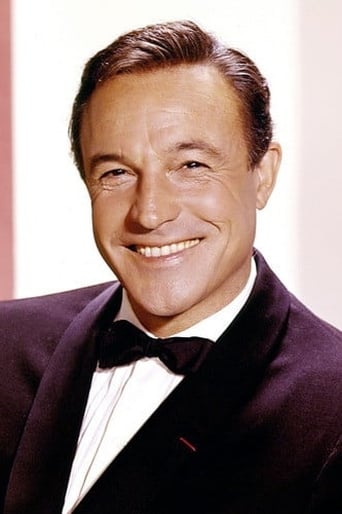Steinesongo
Too many fans seem to be blown away
Ceticultsot
Beautiful, moving film.
MusicChat
It's complicated... I really like the directing, acting and writing but, there are issues with the way it's shot that I just can't deny. As much as I love the storytelling and the fantastic performance but, there are also certain scenes that didn't need to exist.
Curt
Watching it is like watching the spectacle of a class clown at their best: you laugh at their jokes, instigate their defiance, and "ooooh" when they get in trouble.
marcslope
Badly reviewed, but a big 1964 hit, due to the cast and the radio ad, "What a cast! What a show! What a way to go!" Critics were put off, perhaps rightly, by this large comedy's cavalier attitude toward death, and the lumbering direction of J. Lee Thompson, who never had an easy hand with comedy. As a four-time widow with too much money, Shirley's pretty good, and the Comden-Green script, conceived for Marilyn Monroe, is snug and reasonably funny. Best is the gimmick of depicting each marriage in the form of a movie style: silent comedy (Van Dyke), European art film (Newman), Ross Hunter over-production (Mitchum, the funniest, with an incredible procession of Edith Head gowns), and Hollywood musical (Kelly, dumbing down his own choreography somewhat to suit MacLaine). The leading men basically do what's expected of them, though Newman, sporting a Brooklyn accent, revels in playing nastier than usual. Prominent in the supporting cast, and quite wonderful, is Margaret Dumont. It's very expensive-looking, with perhaps the best De Luxe color I've ever seen, and though it pulls its punches here and there and is frequently in questionable taste, it's an undeniable good time.
Hitchcoc
There were several wonderful comedies in the sixties, exclusive of the Doris Day fluff. In this one, Shirley MacLaine has a problem with marriages. Well, not so much with the marriages, with the husbands. You see, marrying her is a death sentence. Each of the husbands starts out as a good catch, but over time they feel they must go for financial success. And succeed they do. As a matter of fact, they become incredibly rich. Unfortunately, through their greed or carelessness or some cosmic force, they meet their individual ends in some creative way, leaving Shirley with another fortune. She longs for the simple life without all the frills and is trying to find real love. The strength of this offering is the clever direction, the outlandish events, and the utter humor (the black kind) as the world collapses on these guys. I saw this film in high school and it was just as captivating today as it was then.
Robert J. Maxwell
This frothy thing is a charming movie (script by Comden and Green) and lots of fun. Shirley MacLaine is the strictly brought-up, naive cutie pie who manages unwittingly to marry a series of hopelessly poor men, each of whom becomes fabulously wealthy. We're talking big names too -- Dean Martin, Paul Newman, Robert Mitchum, et al -- not all of whom are associated with successful comedies.Her first love, in their dusty little town, is the hapless Dick Van Dyke who is perfectly content to spend his time fishing and reading Thoreau, while the arrogant Dean Martin lords it over Van Dyke and everyone else. MacClaine chooses to marry Van Dyke, perhaps partly because he's so abjectly mired in poverty, just to frustrate her mother who has advised her that "money is the root of all." Van Dyke suffers a road-to-Damascus experience and builts his shabby hardware store into a monstrously successful supermarket, then drops dead from the effort, leaving MacClaine a mountain of money. The pattern holds through her subsequent marriages.Well, I suppose Mitchum doesn't start out poor. He starts out fabulously wealthy, a Howard Hughes figure, distant and stern. But he warms to MacClaine, sells off his business enterprises and retires to a little farm with her. He celebrates his retirement with a few hayseed neighbors, gets a little drunk, and tries to milk the bull instead of the cow. "Melrose! FORGIVE ME!", he howls before being kicked for a field goal. He leaves her millions.In some ways the funniest and most satiric episode involves Newman as a Paris taxi driver who is an insane painter filled with contempt for bourgeois morality and greed. He lives in a shabby studio apartment in which a dozen large crane-like arms with paint brushes on the ends are activated by his "sonic palette." Newman bangs drums, operates jack hammers, and makes other random noises and the brushes slap away randomly at a large canvas. The painting are worth nothing. However, MacClaine accidentally activates the brushes by playing a record of Mendelssohn's "Spring Song." Newman has an epiphany while gawking at the brushes now oscillating in harmony. He now begins to produce machine-processed painting by playing classical music and jazz. They're no longer "his" work, although he runs around in a frenzy with a conductor's baton. The value of his paintings soars. They soar even more after the machines conspire to beat him to death. I can only think of one other movie, "The Prize", in which Newman has been in the least funny, fine dramatic actor that he is. He throws himself into the role of mad artist with amazing gusto.I guess I won't go on with this because, as must be evident, the plot has a lot of characters and is a mosaic of sub-plots. Let me add that, in some prints, in a scene in which MacClaine and Mitchum enter a ballroom in evening clothes, she does a pirouette and drops to her knees, at which point her bodice slips a little, but just enough. I only add that for the pre-verts among us. There was no joy in it for me. I've never had an impure thought.
gavin6942
A woman (Shirley MacLaine) wants to live simply (in the style of Thoreau) but every time she marries, her husband becomes rich... and soon dies. Is she a witch? She tries to give the money to the government, but they think she is crazy.This film is fun, silly... but mostly a showcase for Shirley MacLaine in a variety of outfits and situations, including a musical number with tap dancing. MacLaine was very beautiful in her early days (see "The Trouble With Harry") and this is no exception.While Paul Newman looks dashing as the starving artist, Gene Kelly seems washed-up. He can sing and dance, but this is far from his best work and he comes across as simply old much of the time, especially compared to the other husbands. Sorry, Gene.And in the end, that's it: a fun little romp! Yes, I said romp!






